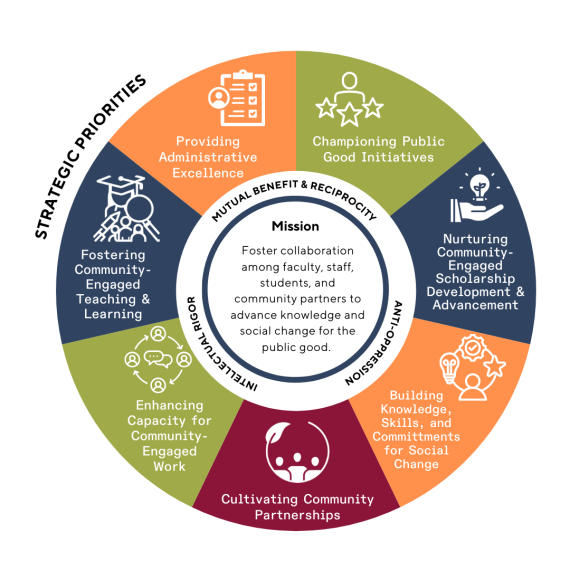About Us
The Center for Community Engagement to advance Scholarship & Learning (CCESL) is part of the Office for Public Good Strategy and Research in Academic Affairs.
Mission, Vision, Values
Mission
The Center for Community Engagement fosters collaboration among faculty, staff, students, and community partners to advance knowledge and social change for the public good.
Vision
Everyone experiences liberation and flourishing through their community-university collaborations.
Values
Mutual Benefit and Reciprocity, Anti-Oppression, and Intellectual Rigor.
Our Approach
We pull on diverse traditions and fields to create a distinctively DU approach to university-community collaboration that bridges community organizing, collective impact, community-engaged scholarship, and anchor mission work. This broad approach puts students, staff, faculty, and community members in dialogue and relationship, and leads to financial, resource, and collaborative strength.
Community engagement is a method, a strategic approach to teaching, scholarship (research, creative work), and service to address public problems through university-community collaboration characterized by mutual benefit and reciprocity. Additionally, these partnerships:
- Share risk, benefit, responsibility;
- Can be local, national, and/or global;
- Can be with diverse entities (e.g., non-profit, government, private sector).
The Carnegie Foundation for the Advancement of Teaching, defines community engagement as “collaboration between institutions of higher education and their larger communities (local, regional/state, national, global) for the mutually beneficial exchange of knowledge and resources in a context of partnership and reciprocity” (Driscoll, 2008, p. 39).
Framework
Ways to Enhance Community Engagement
-
Community Organizing
Community organizing has a rich history in American social movements and focuses on people working together for systemic social change. We apply the philosophy and skills of the community organizing process, such as identifying self-interest, building relationships, understanding root causes, restructuring power, and centering the experience of the communities most impacted by injustice and systemic oppression, to inform how we build partnerships for community engagement. We value the principles and elements of Emergent Strategy in our quest to fulfill our vision of collaborating with communities to improve lives. Emergent Strategy provides a way of approaching our work with a set of skills and strategies “for organizers building movements for justice and liberation that leverage relatively simple interactions to create complex patterns, systems, and transformations – including adaptation, interdependence and decentralization, fractal awareness, resilience and transformative justice, nonlinear and iterative change, creating more possibilities.” (Brown, 2017, p. 24).
-
Collective Impact
Collective impact is an approach to collaboration developed in the nonprofit sector to ensure the broadest and deepest impact possible when groups come together to work towards a goal. Kania and Kramer (2011) proposed the term collective impact to refer to the commitment of actors from different sectors to a common agenda to solve a specific social problem. CCESL organizes our work through a collective impact lens to advance collaborative networks. Individual people and agencies (whether university offices and departments or local organizations) retain their own mission and identities while also forging a shared agenda for public problem solving.
As described recently by DePrince and DiEnno (2019) in Metropolitan Universities, CCESL serves as the backbone organization for supporting community-engaged collective impact efforts, providing support to faculty, staff, students, and community members. In this backbone role, CCESL builds on our established track record in coordinating faculty, staff, and student efforts without commandeering them; chiefly to apply adaptive leadership to advance both individual and collective work. As described in this report, CCESL provides training to faculty, staff, and students in the skills necessary to do public good work using best practices in community engagement. CCESL has developed a hub-and-spoke organizational structures that facilitates work that is responsive to faculty, staff, administrators, and students working in inter- and multi-disciplinary ways with community partners to address diverse issues.
-
Anchor Strategies
Anchor institutions are enterprises that are rooted in their local communities (The Democracy Collaborative, n.d.), such as universities or hospitals. As these institutions can’t move to another city the way most private businesses can, anchor institutions intentionally apply place-based economic power and human capital to build partnerships with local businesses, non-profits, and community members that mutually benefit the long-term well-being of both the University and the broader community.
Our work is guided by anchor principles, which focus on intentionally applying place-based economic power and human capital in partnership with communities to mutually benefit the long-term well-being of both the University and the broader community.
The University of Denver is a member of the Center for Community Wealth Building (CCWB)'s Denver Anchor Network (DAN) and the Coalition of Urban and Metropolitan Universities (CUMU) Anchor Learning Network (ALN).
Buy Local
In an effort to increase and promote local spending, we have created a Buy Local database of local businesses ranging from Catering to Print & Promotion. These are businesses we've either worked with before or provide services for which university staff may often need. Many of these vendors came from lists created by CCWB's Buy Local Initiative or the ShopBIPOC database, both of which have additional businesses you may wish to peruse.
If you have a local business in mind that you'd like to add, please fill out this Buy Local Business Recommendation Form.
Strategic Plan

In August 2024, CCESL submitted a strategic plan to guide our work for the next 5 years, which includes a proposed update to our vision, mission, and values and three overarching goals: deepen connection and relationship-building; build operational strength aligned with the center’s values; and strengthen support for community engagement to flourish. The plan was then reviewed and approved in October 2024. You can view the report and CCESL's new strategic priorities below:
2024-2029 CCESL Strategic PlanEnd of Year Reports
Through Public Good Impact blog posts as well as our End of Year Reports (accessible below), CCESL reports regularly on progress towards our goals and achievements, which directly contribute to DU's public good vision.
